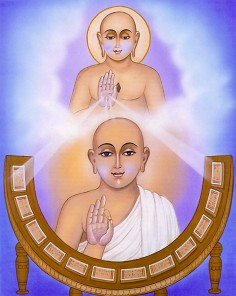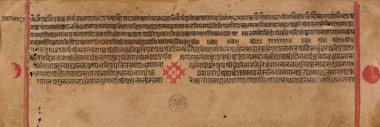Seventeenth Lecture: The Bad Sramana
A Nirgrantha who has entered the order, who has learned the Law, who has received religious discipline, and who has obtained the benefit of Bōdhi which is difficult to obtain, may perhaps afterwards begin to live as he likes. (1)
(He will say:) I have a good bed and wherewithal to cover me; I obtain food and drink; I know everything that comes to pass, friend; why then should I study, sir? (2)
He who, after entering the order, always sleeps, eats, and drinks as much as he likes, and lives comfortably, is called a bad Śramaṇa. (3)
The sinner who despises the learning and discipline which his preceptor and teachers have taught him, is called a bad Śramaṇa. (4)
He who does not, as he should, strive to please his preceptor and teachers, and does not, in his arrogance, treat them with respect, is called a bad Śramaṇa. (5)
He who hurts living beings, seeds, and sprouts, who does not control himself, though he believes himself well-controlled, is called a bad Śramaṇa. (6)
He who uses a bed, a plank, a chair, a seat, or his duster,[1] without having well wiped these things, is called a bad Śramaṇa. (7)
He who walks with great haste and without care, being overbearing and fierce, is called a bad Śramaṇa. (8)
He who carelessly inspects things,[2] throwing down his duster at random, not being attentive to the inspection of things, is called a bad Śramaṇa. (9)
He who carelessly inspects things, his attention being absorbed by what he hears, who always slights his teachers, is called a bad Śramaṇa. (10)
He who is deceitful, talkative, arrogant, greedy, who does not control himself, nor share (his food, etc. with those who are in want), and is not of an amiable disposition, is called a bad Śramaṇa. (11)
He who is a controversialist, and ill-behaved, who perverts the truth, and delights in quarrels and contentions, is called a bad Śramaṇa. (12)
He who sits down on a weak, shaking seat wherever he lists, and is not careful in sitting down, is called a bad Śramaṇa. (13)
He who sleeps with dusty feet and does not inspect his couch, being careless about his bed, is called a bad Śramaṇa. (14)
He who eats milk, curds, and other things produced from milk, and does not practise austerities, is called a bad Śramaṇa. (15)
He who eats after sunset, and when admonished, makes an angry reply, is called a bad Śramaṇa. (16)
He who leaves his own teacher, and follows heretical ones, who continuously changes his school,[3] being of a bad disposition, is called a bad Śramaṇa. (17)
He who has left his own house, and busies himself in another's house, who lives by fortune-telling, is called a bad Śramaṇa. (18)
He who eats the food of his relations, and does not like living by alms,[4] who reposes on the seat of the householder, is called a bad Śramaṇa. (19)
Such a monk, who, like the heretics,[5] does not protect himself from sins, who though having the appearance (of a monk) is the lowest among his worthy brethren, is despised in this world like poison; he is nobody in this world and in that beyond. (20)
But he who always avoids these sins, and is pious amongst his brethren, is welcomed in this world like nectar; he conquers this world and the next.[6] (21)
Thus I say.
Pādakambala, usually called rajōharaṇa. One commentator suggests, as a possible rendering, pātrakambala "a cloth to cover his almsbowl."
It is a monk's duty closely to inspect everything that he uses or comes in contact with, in order to avoid hurting inadvertently anything considered to possess life. This is called paḍilēhā.
Gāṇaṃgaṇika, according to the commentators one who attaches himself to another gaṇa every half-year.
Pañchakuśīla, literally, those who practise the five wrong śīlas, whereby probably those are denoted who do not keep the five great vows of the Jainas. Note that the Buddhists too have their pañchaśīla. They could therefore have been called pañchakuśīla by the Jainas.
 Ganadhar Sudharma Swami
Ganadhar Sudharma Swami
